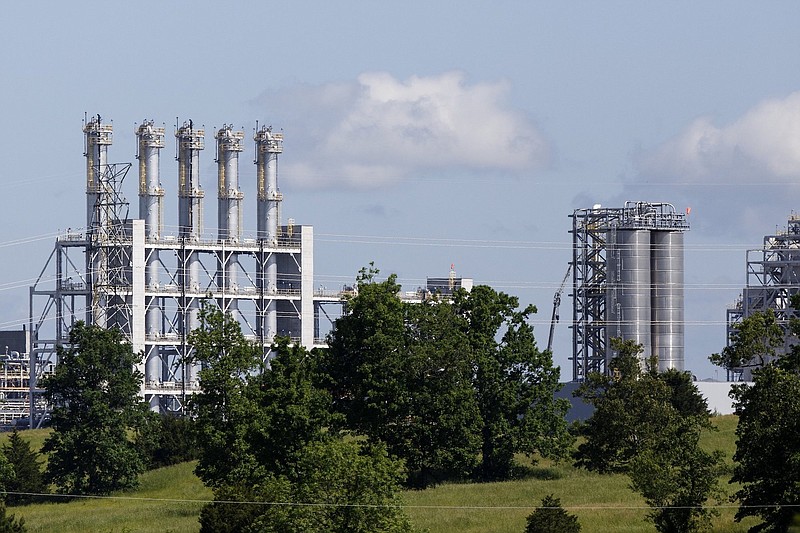The German-based specialty chemical maker Wacker Chemie AG plans to invest another $200 million in its Charleston, Tennessee plant and add another 200 jobs to add production of new silicone rubber and sealant, company officials announced Wednesday.
A feasibility study is underway for the first step of Wacker's plans to expand production within its existing 550-acre riverfront campus in Bradley County, where the company employs about 700 workers.
"The planned expansion measures in Charleston are a further step toward making Charleston a fully integrated site with closed production loops, and an important prerequisite for accelerating our growth as planned," Wacker CEO Christian Hartel said Wednesday in an announcement of the new investment. "Demand for high-performance specialty silicones is showing particularly strong growth. Such specialties enable innovative, tailor-made solutions in key industries such as automotive, construction, electronics and medical technology."
The expansion is the second for Wacker since the global chemical giant built its $2.5 billion plant in Charleston a decade ago as the biggest manufacturing facility for the company outside of Germany.
In 2015, Wacker-Charleston began production of hyper-pure polysilicon used in semi-conductor and high-efficiency solar cells. At the time, the German chemical manufacturer was banking on polysilicon sales to serve the growing global solar energy market.
But when a trade war with China led to tariffs and other trade barriers blocking Wacker from finding its place in the sun, the company shifted markets for its Tennessee production to the even faster-growing computer chip market.
After recovering from a couple of explosions in 2017 that idled plant operations in Charleston for nearly eight months, Wacker has deployed its sprawling plant on the Hiwassee River to help meet the growing polysilicon demand in the semiconductor industry. In 2019, Wacker added a $150 million production line to use some of the byproducts of its main plant to produce Pyrogenic silica, which is used in everything from lipstick and toothpaste to paints, fiberglass and silicone elastomers.
With the newest expansion of its specialty silicones, Wacker will have invested nearly $3 billion in Southeast Tennessee in less than a decade - the largest new investment by any company in the region.
"Wacker continues its specialty strategy providing U.S. domestic production to markets such as construction, consumer care, automotive, and health care," Wacker's U.S. entity president, David Wilhoit, said in an announcement of the expansion Wednesday. "In the U.S., demand for silicones has shown above-average growth in recent years. With this comprehensive investment offensive, we are further expanding our position in the world's second largest chemical market."
The new facilities will be built over several years to produce high-consistency silicone rubber and silicone sealants, which are used in construction applications, company officials said. In addition, plants are to be built in Charleston for the manufacture of intermediates such as silane-terminated polymers used as binders for formulating high-quality adhesives and sealants, liquid waterproofing systems and environmentally friendly wood-flooring adhesives.
Finding the right chemistry in Charleston
"This additional manufacturing capability allows us to continue to expand our global portfolio for downstream products while accelerating our growth and adding high-quality, well-paying jobs in Tennessee," Ken Collins, Wacker senior leader and site director, said in a statement Wednesday.
Wacker is the world's second-largest silicone producer and Hartel said the growing silicone business "is of strategic importance to us."
Wacker's portfolio ranges from silicone fluids, emulsions, resins, elastomers and sealants to silanes, silane-terminated polymers and pyrogenic silica. The products find application in such sectors as automotive engineering, construction, chemicals, cosmetics, medical technology, energy and electronics, and paper and textiles.
"Our site is large and laid out to grow," Collins said in an interview with the Chattanooga Times Free Press earlier this year about the Charleston facility.
At a similar-sized Wacker chemical plant in Burghausen, Germany, there are over 10,000 employees making a variety of products.
"The vision for Charleston is, over the years, to be more like the Burghausen site," Collins said.
German accent in Tennessee
Wacker is among more than 1,000 foreign-based companies that have collectively invested over $40 billion in plants and facilities in Tennessee, according to the Tennessee Department of Economic and Community Development. Germany ranks second behind only Japan for the largest amount of foreign direct investment in Tennessee with a total of 131 companies already investing more than $6.6 billion in the state and creating an estimated 20,486 jobs.
Three of the state's biggest foreign direct investments - Volkswagen of America and BASF in Chattanooga and Wacker in Charleston - are in Southeast Tennessee.
"Germany is one of Tennessee's top countries for foreign direct investment, so we appreciate this additional investment from Wacker, a company that could have chosen anywhere in the world to expand its global footprint," Stuart McWhorter, commissioner of Tennessee's Department of Economic and Community Development, said in a statement Wednesday.
Bradley County Mayor D. Gary Davis said in a statement Wednesday the new investment by Wacker "will be a tremendous shot in the arm for our community and the region.
"The addition of silicone production to its existing Charleston operations in polysilicon and HDK is a clear sign that Wacker is fulfilling its commitment to develop a fully integrated production system focused on closed material loops and energy efficiency," Davis said.
Tennessee Gov. Bill Lee also lauded the Wacker investment and said it underscores the appeal of Tennessee for business.
"Companies choose to invest in Tennessee because of our skilled workforce, strong business climate and quality of life," Lee said.
Cleveland Mayor Kevin Brooks, who worked to recruit Wacker to the area while a state representative in the General Assembly, said in a statement Wednesday that "it has been gratifying to see this dream become a reality in north Bradley County.
"The state of Tennessee continues to show that our state is truly 'America at its Best,'" he said.
Contact Dave Flessner at dflessner@timesfreepress.com or at 423-757-6340. Follow him on Twitter @dflessner1.
